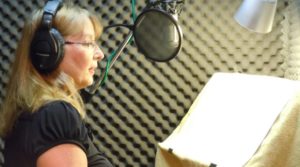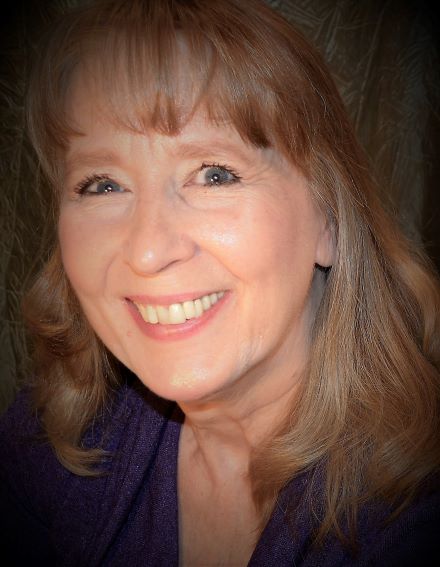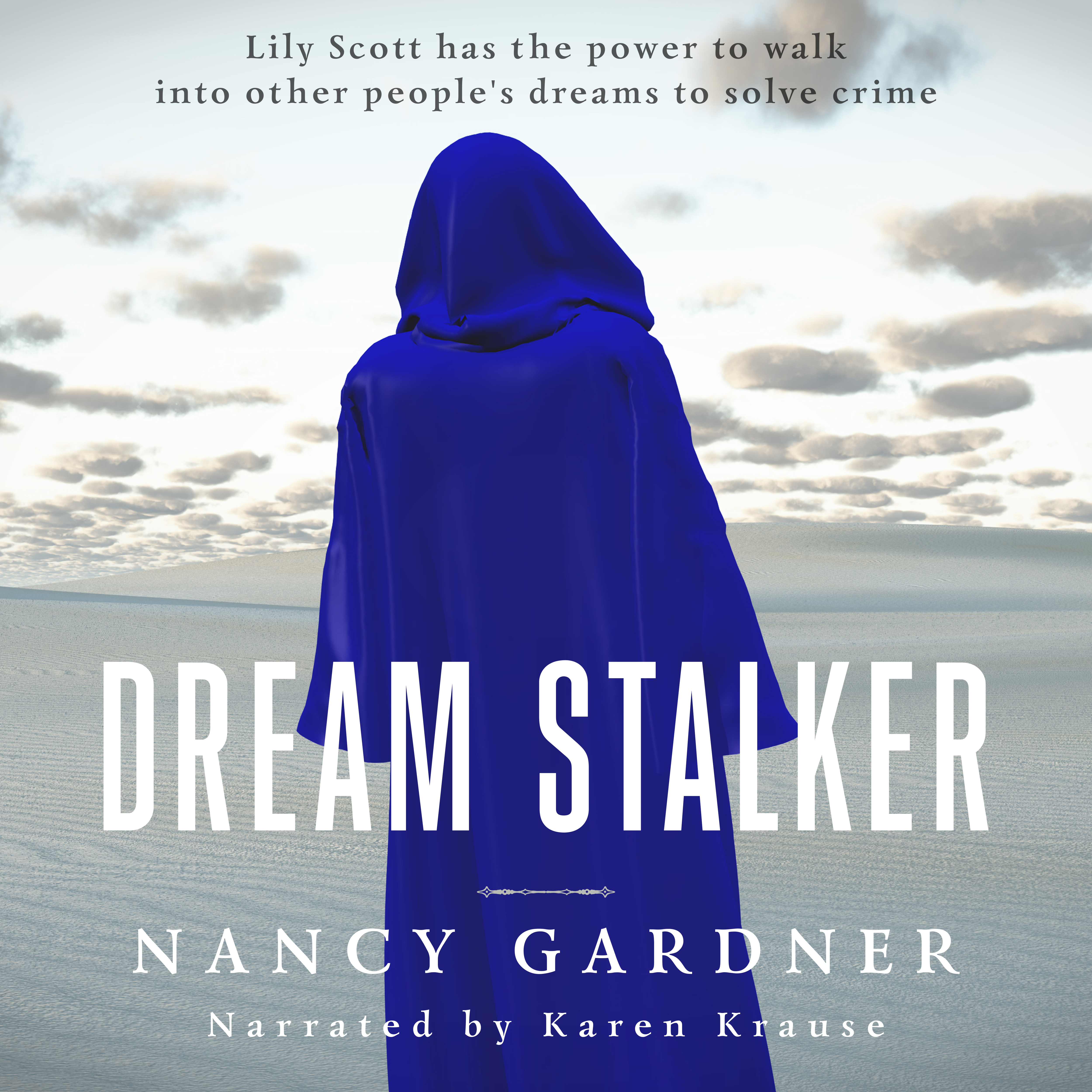A Visit with Karen Krause
This month we visit with Dream Stalker narrator, Karen Krause. Karen and I met through a company called Findaway Voices. The moment my husband David and I heard Karen’s narration, we knew she WAS the voice of Lily Scott.
Click to hear Karen perform the 1st chapter of Dream Stalker
NG: Thank you so much for talking to us, Karen. Your biography tells us you grew up in a musical family in the Ozark mountains and sang in your father’s band. Tell us about how your early musical experience prepared you for the challenge of narrating audiobooks.
KK: Hmmm, that’s a good question. I’ve never really tried to make that connection before, but as I think about it, it was the beginning of a circuitous path to audiobooks. I was 8 or 9 at the time and pretty shy. I’m the youngest of three girls and we sang as a trio. We called ourselves The Calendar Girls (April, May and June) after the popular song of the time. My older sisters sang lead and alto, but rather than trying to get me to learn a harmony line, my dad told me to just listen to the bass guitar and sing the notes he played (I think that’s why to this day I never sing along with the melody—I’m always making up my own harmony). Being the youngest child, I loved attention and realized I could get all the attention I wanted by being “cute” on stage. This set me on the quest for more stage opportunities.
I discovered “The Theater” in 5th grade, when I was given the lead role in our Spanish class production of “La Caperacita Roja” (Little Red Riding Hood), performed entirely in Spanish of course. The next year our music class mounted “The Sound of Music” with me as Mother Superior, and my fate was sealed. As I performed more and more theater, I began to love “becoming” a new character and telling their story.
Way back when I was that shy child craving attention, I developed a passion for stories and spent most of my free time high in a tree, or under my covers at night, reading all the fiction books I could find. That passion stayed with me throughout my life, and when audiobooks were “born,” I was hooked on listening as well as reading. It took a while, but finally the epiphany hit me: I could combine both of my passions and tell those stories I loved through audiobooks.
I apologize for such a looong answer to this question. The short answer: Singing with my daddy’s band made me realize how much I loved being on stage; the music stage morphed into the theatrical stage; my love of the stage grew into a love of acting; that love of acting, combined with my passion for books and stories, translated into my love for telling those stories that I love reading.
NG: I read that author Brad Meltzer compares the relationship between an author and a narrator to the collaboration between wordsmith Bernie Taupin and musician Elton John. In other words, the author supplies the words, and the narrator supplies the music. Do you agree? What’s your take on writer/narrator collaboration?
KK: I think this is great analogy, and I can see how it applies to the audiobook narration process. However, I think my perspective is a little different. I think of the words as the notes on a page of music. The notes tell the story and dictate the movement and pace. These are tangible and relate directly to the writer’s storyline. The singer then performs the piece, staying true to the notes written, but using the musical notations as clues to develop the flow, dynamic energy, passion, nuance and arc of the music, just as the narrator uses the notations within the written story to add nuance and depth to characters and paint the emotion and intensity of the scene. “He stabbed her in the heart” is an example of the notes on a piece of music. The words are fixed and unambiguous. They describe an event fixed in the story’s timeline. The next line, however, could be an example of a musical notation. “As he released the knife handle, his anger and hatred released as well, replaced with sorrow and grief as he crumpled to the ground.” There is so much room for interpretation here. There are still events described that are fixed in the storyline (he lets go of the knife and falls to the ground), but the emotions allowed to enter into the description give us the intangible aspects that allow artistic interpretation.
NG: I’ve also read that narrator John Lescault has called audiobooks “theater of the mind.” You seemed to inhabit my Dream Stalker characters. Do you have theatrical training? If so, how is narrating an audiobook different from acting on stage?
KK: Yes, many years of stage and film experience, with college training and coaching. Stage, film and audio all need trained acting skills, but they also all use different styles and techniques. When on a stage, where audience members (especially those in seats at or near the back of the house) cannot see the subtleties of facial expressions and posture changes, the actor must play larger and louder. And for some genres these are even exaggerated. Film is much more intimate and must be played like the audience is seated next to you. Audio is like a film in that there is such intimacy and requires the actor to pull back a little to convey that intimate conversation. But audio also does not have the benefit that film has wherein you can see the face, the posture, etc. So audio still has to convey that aspect in the energy and intensity of the delivery. I find it much more challenging than film or stage because of that aspect.
NG: An unexpected benefit of working with you was when you found a place where I said a child was three on one page and five on another. Your timely feedback meant I could go back to the manuscript and fix the problem. That tells me you really studied the story before you interpreted it. How much study goes into preparing to read a scene?
KK: A lot! At least for me it does. Unless I’m on a really, really tight schedule I will first read the book through once, without taking notes, just immersing myself in the story, getting the feel for tone and arc. If I’m on a super tight deadline, l may skip the first reading, but I ALWAYS go on to my prep reading. There, I’ll go through it again, making notes, marking words for pronunciation research or specific emphasis, making character notes, and marking spots that just don’t make sense because of typos or wording or that conflict with what I understand of the storyline. WEven then, I’m surprised by how many times I miss something until I’m actually in my booth recording that section.
NG: You do accents really well. In one of my chapters, there are three distinct voices, a Southern male, a Scottish female and the main New England female character. I loved how the subtle changes to your voice brought each character to life without sounding overwrought. Was that the toughest scene to interpret, or was there a tougher one? What type of scenes are the most fun to narrate?
KK: First: Thank you! I absolutely love doing accents. Those scenes with dialogue between several different characters are challenging, but they’re still way up there on my favorites meter. Probably one of my biggest challenges is narrating action scenes. As a stage actor I’m used to portraying action, not talking about it. So I have to make myself find that balance where it is compelling and yet not over the top.
NG: What do you find is the most enjoyable part of your job? What’s the least?
KK: That’s easy peasy. I love being in the booth performing. That’s why I do what I do. I also love reading and prepping because—I love stories!! I don’t even mind the research because I love learning new things. I guess my least favorite is listening to myself. I always listen to each chapter before I upload the files just to make sure no audio artifacts or weird things happened when the files were bounced. I’m just ultra-critical of my performance.
NG: Do you have your own recording booth? What gear do you use to narrate? How much preparation goes into producing an audiobook? What’s the day in the life of a narrator like?

Karen works in her recording booth
KK: Yes, I have my own booth. I’m one of the dinosaurs that still reads off of paper. I tell myself with each new book that I should go to digital copies, but there’s just something about that paper.
I have a sound booth with a modified condenser microphone, boom stand and pop filter; a pre-amp and digital interface (since the condenser microphone is an analog mic). I use ProTools and RX for recording, editing and mastering.
As for prep time, it can vary depending on the book. For all books I follow the procedure outlined above. I read through the book twice, taking notes and marking up the manuscript on the second go through, so that’s at least 2 hours per finished hour of the book. If there are a lot of typos or a lot of research (such as accents, pronunciations, historical questions), that can add another hour per finished hour of book. Some books with lots of accents and/or foreign words can take a LOT of research time. And then working on perfecting an accent if I haven’t done it before or for a long time can take several hours.
Since I’ve mostly retired from all but audiobooks, I can afford a relaxed schedule. I generally get up a couple of hours before a scheduled recording session and take my allergy medicine, have a cup of coffee, and finish up any pre-recording tasks. I start recording around 10 a.m. till noon or one-ish. After lunch I may get in a walk and then do some editing/proofing or prepping until time for dinner. I fit auditions in between as necessary. Most evenings are for social time or downtime.
Of course this only stands if I’ve not overbooked for some reason. Then, it’s audiobooks all day and into the evening.
NG: You’ve narrated over fifty audiobooks and won an Independent Book Award for your narration of The Book of Dragons by E. Nesbit. Do you have any advice for aspiring narrators?
KK: Narrating Audiobooks (at least narrating them well) is not for everyone. Please research the field, from the equipment you’ll need for a home studio to the technical processes you’ll need to learn, the acting skills and techniques to do the job (especially if you have no acting background), and especially how the business works. Nowadays there’s no excuse for not doing your homework. So many resources are out there free to help you get the feel of the industry and whether it’s a good fit for you. Just as in any field, there is training involved. Find coaches and mentors. Learn how to use the DAW (Digital Audio Workstation) you choose. Realize there will be a learning curve. Your first book(s) will likely require that you edit and master the audio yourself (or pay a professional engineer to do that for you, so make sure you budget for that). If you do it yourself, be prepared to spend as much as 10 hours (or more) per finished hour of book. Practice and experience will get this down to a much more reasonable ratio, but it will take time to get there.
NG: What do you do for fun when you’re not busy narrating?
KK: Believe it or not, I read. I walk. I spend time with my family and friends. And I travel.
NG: Is there a something I didn’t ask that you’d like us to know?
KK: Oh my, haven’t you heard enough about me yet? LOL
I’m one of three sisters and have three daughters. I think there’s something very special about three sisters. And my daughters do also. I’m married to a professional musician and retired University professor. I love to travel, am into photography, have been performing on stage and in films for over 30 years, have been a costumer for a couple of theatre companies in the area, and I worked in a legal office and in IT for many years.
NG: Working with Karen has been a pleasure, and I hope you enjoyed meeting her, too.
Click here to purchase and listen through the Authors Direct app.




Hi David, I agree. There’s much more training, skill and technology needed to perform an audiobook!
Fascinating. I hadn’t realized what a production this was. I thought that the reader just sat down for an afternoon, recorded the book and that was that.
Hi David. So nice to virtually meet you. I’ve listened to audiobooks that sounded like they were read cold in an afternoon. It’s not pretty. (And if I’m being honest, rarely did I get to the end.)
Karen,
I know what you mean. I’ve given up on audio books that I like only because the reader got on my nerves.
BTW: Great job with Nancy’s book.
This is a great interview — as an avid reader and audio listener I have always been curious about this process. It was great fun to hear about it from a pro and consider the many details of preparation. My question is — often an audio book is read by the author. Do you think that makes a difference (for better or worse) in the delivery?
Hi Ginni, great question. From my perspective, I’d never want to subject readers to my own voice or interpretation–just voicing the few lines for my book trailer was nerve-wracking. Hope you’re having fun at the beach 🙂
Hi Ginni! Great question! I’ll tell you my opinion. I think that, generally, the audiobook is better when narrated by a professional narrator instead of the author. There are exceptions to this of course, depending on the author’s speaking/acting experience, the content and genre of the book and her access to a professional studio and/or equipment. Let me ask: Do you think an aria is better sung by a professional opera singer (who has spent years training and strengthening her voice) or the composer (who has spent years learning and immersing himself in the creation of the music but probably not in training his voice)? The composer certainly has a unique personal connection to the music, but does he have the vocal talent , skill, and experience to perform that aria as well as that professional singer? The two have spent their careers focusing on two totally different aspects of the opera – creation and performance – which require completely different talents and skill sets.
Hi Nancy! It was such a pleasure telling Lily’s story. Thank you!
I hope we get some questions from folks, Karen. The work you do is fascinatiing!